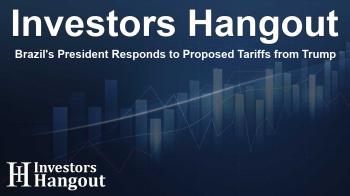Brazil's President Responds to Proposed Tariffs from Trump

Increasing Tensions Between the U.S. and Brazil
Tensions are rising between the United States and Brazil, particularly following recent communications from President Donald Trump regarding potential tariffs. Trump's proposal to impose sweeping 50% tariffs on imports from Brazil has sparked significant controversy.
Details of Trump's Communications
In a recent letter to Brazilian President Luiz Inácio Lula da Silva, Trump characterized the trial of former Brazilian President Jair Bolsonaro as a 'Witch Hunt' that he insists should be halted immediately. He accused Brazil of undertaking 'insidious attacks on Free Elections,' a claim that has led to the proposed tariff measures.
Concerns Over Trade Practices
Trump's correspondence does not stop there; he levied accusations against Brazil's Supreme Court for issuing numerous secret and unlawful censorship orders targeting U.S. social media platforms. He stated that such actions threaten free speech and violate trade norms, heightening concerns over Brazil's regulatory environment.
Economic Implications of Tariffs
Further compounding the situation, Trump asserted that these tariffs would take effect immediately, suggesting that all Brazilian goods would incur the 50% fee, with additional charges on products routed through third countries. Alongside the tariffs, he has instructed the U.S. Trade Representative to investigate Brazil's digital trade practices, identifying potential barriers preventing fair market access.
Lula's Reaction
In response to Trump’s communication, President Lula firmly stated that Brazil would not accept any form of tutelage and defended the legal proceedings against Bolsonaro, asserting judicial sovereignty as a priority. His administration has emphasized that Brazil's stance reflects its commitment to defending its democratic processes.
Brazil’s Commitment to Regulatory Standards
While addressing Trump’s claims regarding trade practices, Lula highlighted that statistical evidence from the U.S. government demonstrates a significant trade surplus of $410 billion with Brazil over the past 15 years. He vowed to respond to any unilateral tariff hikes according to Brazil's Economic Reciprocity Law, indicating a firm and diplomatic stance on trade relations.
The Context of BRICS Relations
This incident follows Trump's threats of a purported additional 10% tariff on countries aligning themselves with BRICS, the intergovernmental coalition that Brazil helped establish. Such threats underscore the complex and often contentious dynamics between the United States and its international partners.
Broader Implications for Trade Policy
The backdrop of these tensions is also marked by the ongoing conflict between Elon Musk's social media platform, X, and Brazil’s judiciary. Musk’s platform has faced scrutiny for a series of regulatory issues, amplifying the already strained relations between Brazil and certain U.S. tech entities.
Future Outlook
As these developments unfold, Lula has reinforced Brazil's dedication to sovereignty, respect for human rights, and the unwavering defense of national interests. This situation will likely impact Brazil's international relationships and could influence how other nations perceive trade practices and regulatory environments moving forward.
Frequently Asked Questions
What prompted the tariffs proposed by Trump?
The tariffs were prompted by Trump's perception of Brazil's attacks on free elections and the legal proceedings against former President Bolsonaro.
How did President Lula respond to Trump's letter?
President Lula stated that Brazil would not accept any form of tutelage and emphasized the necessity of judicial sovereignty.
What economic implications do the tariffs have?
The proposed tariffs would impose a significant financial burden on Brazilian exports, potentially affecting trade relations profoundly.
What is Brazil's position regarding its trade surplus?
Lula highlighted that statistics show a trade surplus with the U.S., countering claims about trade deficits impacting national security.
How might these tensions affect international relations?
These tensions could lead to shifts in alliances and redefine trade policy among nations aligned with either the U.S. or BRICS members.
About The Author
Contact Lucas Young privately here. Or send an email with ATTN: Lucas Young as the subject to contact@investorshangout.com.
About Investors Hangout
Investors Hangout is a leading online stock forum for financial discussion and learning, offering a wide range of free tools and resources. It draws in traders of all levels, who exchange market knowledge, investigate trading tactics, and keep an eye on industry developments in real time. Featuring financial articles, stock message boards, quotes, charts, company profiles, and live news updates. Through cooperative learning and a wealth of informational resources, it helps users from novices creating their first portfolios to experts honing their techniques. Join Investors Hangout today: https://investorshangout.com/
The content of this article is based on factual, publicly available information and does not represent legal, financial, or investment advice. Investors Hangout does not offer financial advice, and the author is not a licensed financial advisor. Consult a qualified advisor before making any financial or investment decisions based on this article. This article should not be considered advice to purchase, sell, or hold any securities or other investments. If any of the material provided here is inaccurate, please contact us for corrections.

